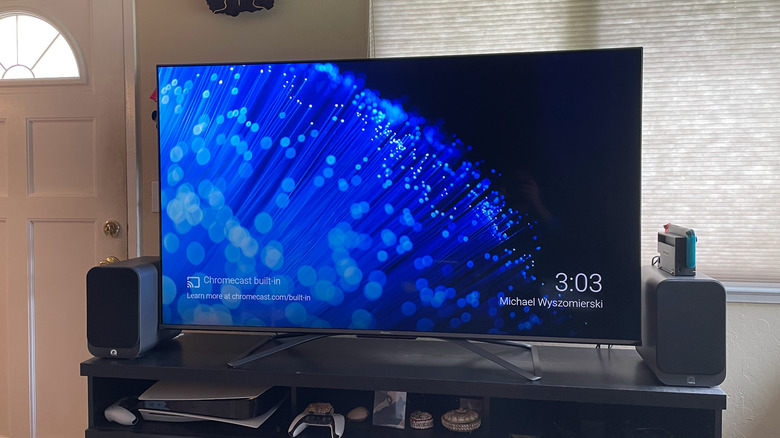Hisense U8G ULED Android TV Review: High Quality On A Budget
When you think of TV manufacturers, you probably think of the likes of LG and Samsung. But in recent years, Hisense has risen as a serious competitor to these companies, especially in the lower-end and midrange. Recently, the company unveiled its latest models that aim to compete with the big players — including the new Hisense U8G.
The Hisense U8G builds on Hisense's work with its ULED tech over the years, which has reproved itself as an excellent way to get quantum dot technology, with deep black levels. Past ULED models have been bright, vibrant, and detailed, without a high price tag. At a starting price of $950, does the new Hisense U8G compete?
Well, yeah. It does. But the rising price tag should give potential customers pause. Note, we're reviewing the 65-inch model (Hisense 65U8G), which comes in at $1,300. There's also a 55-inch model which is available for $950.
Hisense U8G design and setup
The first thing to notice about the Hisense U8G is its design, and it's a good-looking TV.
Recently, Hisense has been taking more liberties with TV design, straying away from the typical feet that you can find on most lower-end TVs. The U8G instead has larger legs that branch out from the middle. It helps make for a more modern look as a whole. The downside to this approach is that it has a deeper footprint. That makes it harder to find room for a soundbar. If you have enough room, you'll like the look.
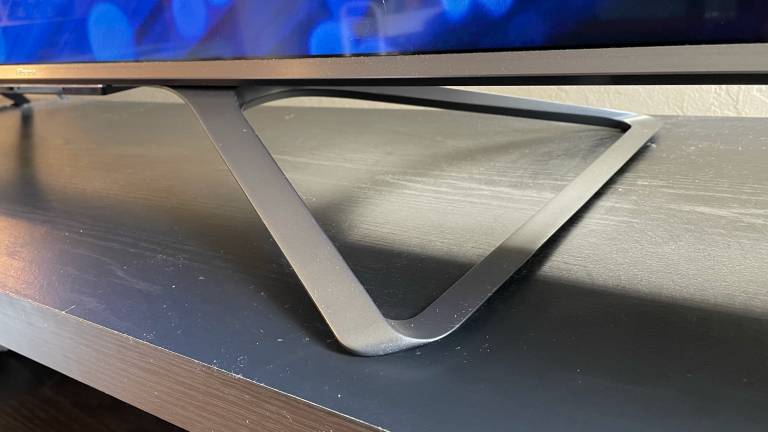
Hisense U8G Review Legs
The bezels around the TV are relatively slim, coming in at a little less than half an inch. Frankly, you'll barely notice the bezels around the display, except the bottom one, which is thicker than the others.
On the back of the TV is where you'll find all its ports, and there's a good selection. The U8G offers four HDMI ports, including two that support HDMI 2.1 and two that support HDMI 2.0. You'll also get two USB ports, an Ethernet port, an optical port, and a headphone jack. Add in the fact that the TV supports HDMI eARC, and you should have more than enough ports for your needs.
The design of the remote is also worth considering, and while it looks a bit vanilla, with its plastic design and larger build, it definitely gets the job done, and is relatively easy to navigate. There are software controls, playback controls, and quick-access controls for some of the larger streaming services, including Netflix, Disney+, and Prime Video. There's also Tubi, which is a bit of a weird pick. Hulu or HBO Max may have been a better choice there.
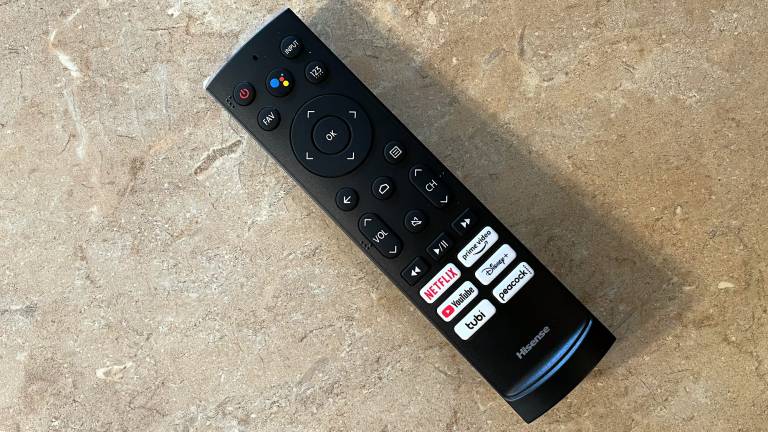
Hisense U8G Review Remote
Setting up the U8G is simple, thanks largely to the Android TV software. You'll agree to the terms and conditions, sign in to your Google account, download your preferred streaming apps, and so on. Easy.
Hisense U8G software
As mentioned, the Hisense U8G comes with Android TV, and it works relatively well here. A few years ago, only the highest-end TVs could run Android TV without being slow and unresponsive. These days, most midrange TVs are able to handle the processing power needed for the software.
Generally speaking, Android TV is easy to navigate and well-designed. The interface offers a row of apps at the top, along with a row of content per app under that. You can choose which apps show content on the Home Screen too, so it's somewhat customizable.
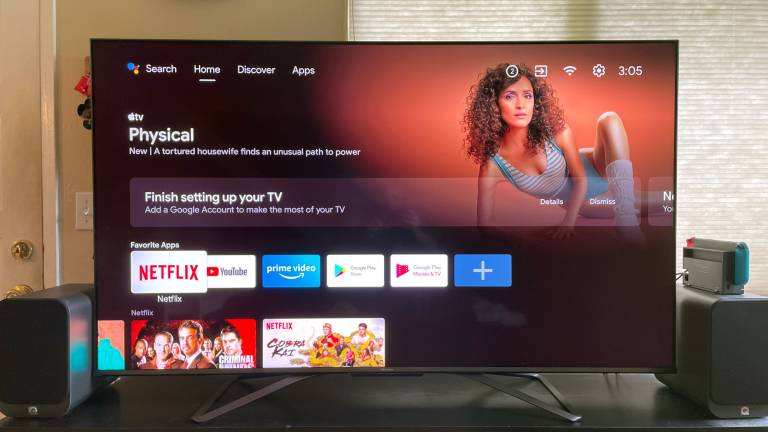
Hisense U8G Review Android TV
Google Assistant is also front-and-center here, with a button to access the assistant on the remote. Assistant is relatively quick and responsive here, plus it works just like on any other device — allowing you to control content and open apps, control smart home devices, and access information from the web. You can also use hands-free Google Assistant by using the "Hey Google" wake word, even when the TV is off, which is a nice touch. It basically means the TV can work as a Google Home speaker.
Because this is an Android TV device, unfortunately, it's a little locked down. These days, many TVs integrate decently well within Apple's ecosystem, offering AirPlay and HomeKit support. Android TV doesn't offer either of these, though it does work with Alexa. Safe to say, this is a TV for those who prefer to stick within Google's ecosystem of products, or those who plan on using a streaming device like the Apple TV 4K.
Hisense U8G performance
Perhaps the most important thing to consider is image quality, and that's where the Hisense U8G shines. The TV gets nice and bright, boasts excellent contrast, and displays beautiful colors.
Under the hood, the Hisense U8G offers a solid 132 dimming zones, up to 1500 nits peak brightness, and supports Dolby Vision, HDR10, HDR10+, HLG, and Dolby Vision HDR formats. In other words, it supports pretty much all HDR formats you could want in 2021.
The result of all this is excellent image quality. Watching 4K Dolby Vision content made for a great viewing experience, with vibrant colors and deep black levels. Under normal viewing circumstances, there's really very little to complain about. Display tests do reveal some blooming, and grays aren't as uniform across the display as you would want for things like sports, but the vast majority of users won't notice either of these things. The main downside is that image quality does radically decline at larger viewing angles, so you may want to keep that in mind depending on your living room setup.
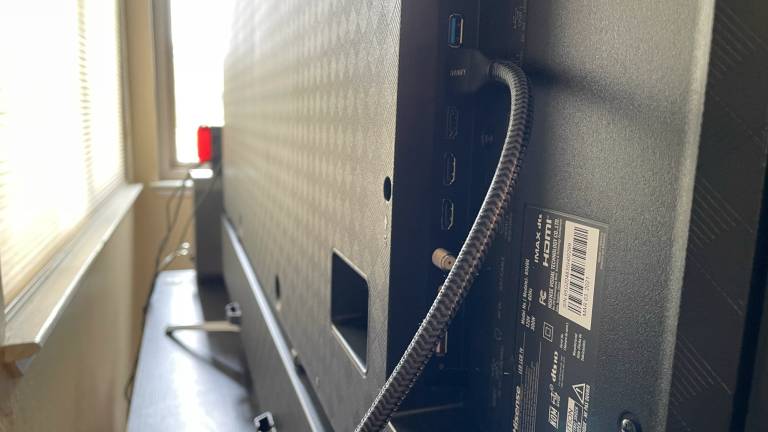
Hisense U8G Review Ports
In HDR, the TV offers a number of display modes, including a Sports mode, Standard mode, Vivid mode, and so on. Frankly, the Vivid mode was a little over-the-top, and we ended up sticking with a slightly tweaked Standard mode. As is common these days, motion smoothing was turned on by default, and we promptly turned it off. Users can select how much motion smoothing they want, if any at all, which is nice.
Lower resolution video looks pretty good too. The TV offers Hisense's upscaling tech, and I found that it worked quite well. 1,080p video looks pretty close to 4K, and while 720p video doesn't quite get there, it still looks good for what it is. Don't be afraid to watch cable TV on this TV, if you still watch cable.
Gaming on this TV is a dream too. The TV supports a native 120Hz refresh rate, and even supports variable refresh rate and AMD FreeSync. Playing on a PS5 made for an immersive, smooth experience, so if you're looking for a TV that supports next-gen consoles, this is a great option.
Hisense U8G audio
The Hisense U8G offers decent built-in audio for a TV in this price range, but as with any TV, if you can afford a decent soundbar or sound system, you should get one. It will greatly enhance the overall experience, and make for a much more immersive sound.
The speakers that are built-in offer a little better bass response than you would expect, but it's still not super deep or extended. Mids are a little on the heavy side, and there isn't a ton of detail in the high end.
Conclusions
The Hisense U8G is another home run from Hisense. The TV offers an excellent image quality and better built-in audio than most. There's also tons of support for all the gaming features and HDR standards you would want in 2021, and Android TV works very well here. It's not perfect. There are still some inconsistencies in the image, and there's no support for Apple's ecosystem. But in this price range, it's easily among the best.
The competition
If you're looking for a midrange TV and could stand to save a little cash, then it's worth looking into the TCL 6-series, which switches Android for Roku, meaning you'll get HomeKit and AirPlay support. Alternatively, you could consider one of LG's lower-end OLED TVs, which offer perfect black levels without issues around blooming and uniformity. The Hisense U8G, however, gets brighter, and doesn't come with the risk of burn-in like OLED panels do.
Should I buy the Hisense U8G?
Yes. The Hisense U8G is easily one of the best TVs in this price range, and if you can afford to get it and a soundbar or speaker system, you'll get an excellent home theater experience.
